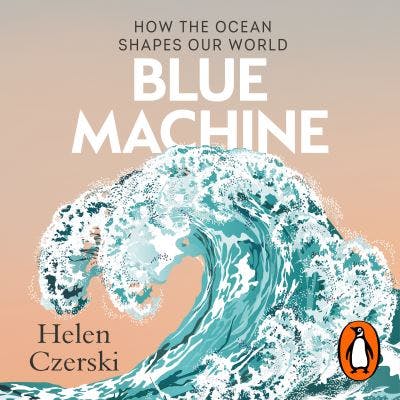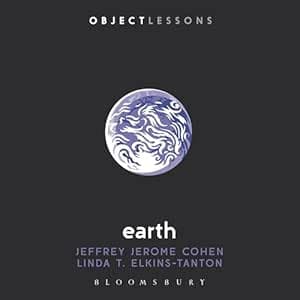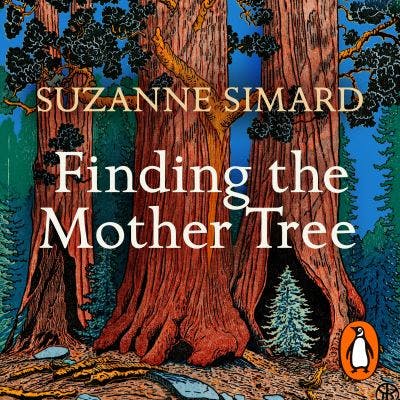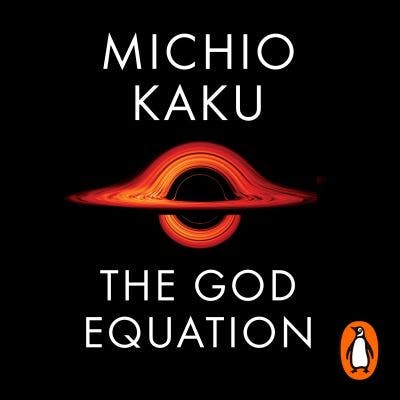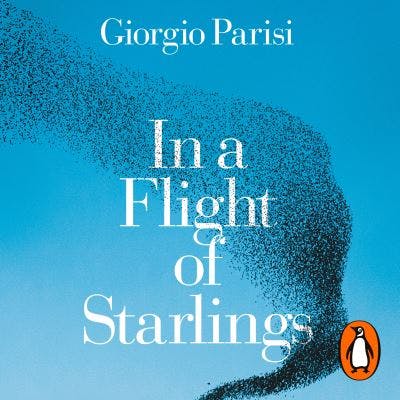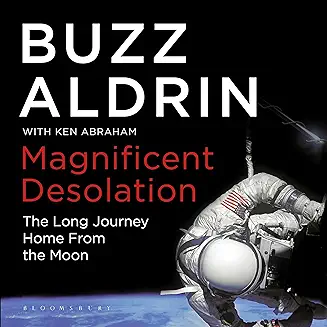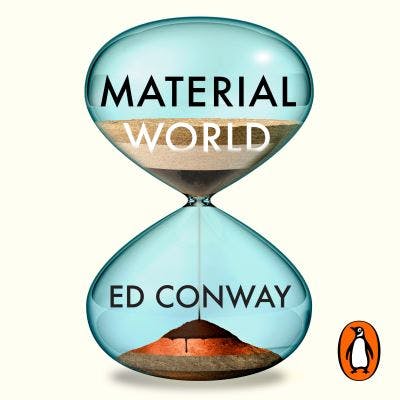Science - Earth & Physical
Read by: John Hobday
Duration: 16 hrs 30 mins
A wonderful journey through time, along the waves of our planet's most significant ocean, in an irresistible blend of gripping history, fascinating science and exhilarating reportage.
Read by: Vanessa Chakour
Duration: 14 hrs 30 mins
We all come from different cultures and practice different spiritual traditions, but we have one thing in common: we are all of the earth. Vanessa Chakour, founder of the rewilding programme Sacred Warrior, takes us on a journey to deepen our relationship with ourselves and the environment. Awakening Artemis is her love letter to the earth.
Sharing her personal journey of rewilding, her stories act as tools, both practical and inspirational, to encourage growth, healing and reconnection to the regenerative power of the natural world. Vanessa will help you embrace the strength and beauty in the wild, the weeds, and the unsavoury parts of yourself in order to grow and heal. By allowing yourself and the earth to flourish and awakening your inner Artemis, Chakour promises that you will find joy, peace, compassion for yourself, others, and the planet.Read by: Xe Sands
Duration: 5 hrs 30 mins
What came before the Big Bang, and what exists outside of the universe it created?
Until recently, scientists could only guess at what lay past the edge of spacetime. But as pioneering theoretical physicist Laura Mersini-Houghton explains, today new scientific tools are giving us the ability to peer beyond the limits of our universe and test our theories about what is there. Her groundbreaking research suggests that we sit in a quantum landscape whose peaks and valleys hide a multitude of other universes, and whose topography holds the secret to the origins of existence itself. Recent evidence has revealed the signatures of one such sibling universe in our own night sky, confirming Mersini-Houghton's theoretical work and offering humbling proof that our universe is just one member of an unending cosmic family.
A mind-expanding journey through the multiverse, Beyond the Big Bang will reshape our understanding of humanity's place in the unfathomable vastness of the cosmos.Read by: Helen Czerski
Duration: 14 hrs 52 mins
All of the Earth's ocean, from the equator to the poles, is a single engine powered by sunlight - a blue machine. In a book that will recalibrate our view of this defining feature of our planet, physicist Helen Czerski dives deep to illuminate the murky depths of the ocean engine, examining the messengers, passengers and voyagers that live in it, travel over it, and survive because of it.
From the ancient Polynesians who navigated the Pacific by reading the waves to permanent residents of the deep such as the Greenland shark that can live for hundreds of years, she explains the vast currents, invisible ocean walls and underwater waterfalls that all have their place in the ocean's complex, interlinked system. Timely, elegant and passionately argued, The Blue Machine is one of the biggest stories ever told. The understanding it offers is crucial to our future. Drawing on years of experience at the forefront of marine science, Helen Czerski captures the magnitude and subtlety of this complex force, showing us the thrilling extent to which we are at the mercy of this great engine.
Read by: Amy Shira Teitel
Duration: 8 hrs 38 mins
The incredible story of spaceflight before the establishment of NASA.
In the 1930s, rockets were all the rage in Germany. One of the key figures in this period was Wernher von Braun, an engineer who designed the rockets that became the devastating V-2. As the war came to its chaotic conclusion, von Braun escaped from Nazi Germany, and was taken to America where he began developing missiles for the US Army.
Meanwhile, the US Air Force was looking ahead to a time when men would fly in space and test pilots like Neil Armstrong were flying cutting-edge, rocket-powered aircraft in the thin upper atmosphere.
Breaking the Chains of Gravity tells the story of America's nascent space program, its scientific advances, its personalities and the rivalries it caused between the various arms of the US military.
Read by: Ben Whishaw
Duration: 4 hrs
Stephen Hawking, the world-famous cosmologist and bestselling author of A Brief History of Time (2694), leaves us with his final thoughts on the universe's biggest questions in this brilliant posthumous work. As we face potentially catastrophic changes here on Earth, this is his personal view on the challenges we face as a human race, and where we, as a planet, are heading next.
Read by: John Sackville
Duration: 7 hrs 18 mins
Was there a beginning of time? Could time run backwards? Is the universe infinite or does it have boundaries?
These are just some of the questions considered in the internationally acclaimed masterpiece by the world renowned physicist - generally considered to have been one of the world's greatest thinkers.
It begins by reviewing the great theories of the cosmos from Newton to Einstein, before delving into the secrets which still lie at the heart of space and time, from the Big Bang to black holes, via spiral galaxies and strong theory. To this day A Brief History of Time remains a staple of the scientific canon, and its succinct and clear language continues to introduce millions to the universe and its wonders.
Read by: Derina Dinkin
Duration: 13 hrs 50 mins
The author has travelled the globe in search of the oddities of nature, prized so highly for jewellery and adornment. And why, when we can now manufacture synthetic gems, do jewels still hold such appeal?
Read by: Jonathan Todd Ross
Duration: 12 hrs 33 mins
Could there be a civilization on a mote of dust? How much of your fate have you made? Who cleans the universe? Through more than fifty Koans - pleasingly paradoxical vignettes following the ancient Zen tradition - leading physicist Anthony Aguirre takes the reader across the world from Japan to Italy, and through ideas spanning the age, breadth and depth of the Universe.
Playful and enlightening, Cosmological Koans explores the strange hinterland between the deep structure of the physical world and our personal experience of it, giving us what Einstein himself called "the most beautiful and deepest experience" anyone can have: a sense of the mysterious.
Read by: John Hobday
Duration: 15 hrs
In 1906 San Francisco came crashing down beneath the wave of a horrifying earthquake. Simon Winchester's breathtaking story portrays the lives of the people who suffered and survived the devastation. He also tells of the hubris of man as he ignores the warnings of nature and how we try to understand the world around us.
Read by: Mack Gordon and Rachel Handshaw
Duration: 3 hrs 15 mins
In Earth, a planetary scientist and a literary humanist explore what happens when we think of the Earth as an object viewable from space. As a "blue marble," "a blue pale dot," or, as Chaucer described it, "this litel spot of erthe," the solitary orb is a challenge to scale and to human self-importance. Beautiful and self-contained, the Earth turns out to be far less knowable than it at first appears: its vast interior an inferno of incandescent and yet solid rock and a reservoir of water vaster than the ocean, a world within the world. Viewing the Earth from space invites a dive into the abyss of scale: how can humans apprehend the distances, the temperatures, and the time scale on which planets are born, evolve, and die?
Read by: Suzanne Simard
Duration: 12 hrs 13 mins
A dazzling scientific detective story from the ecologist who first discovered the hidden language of trees. No one has done more to transform our understanding of trees than the world-renowned scientist Suzanne Simard. Now she shares the secrets of a lifetime spent uncovering startling truths about trees: their cooperation, healing capacity, memory, wisdom and sentience.
Raised in the forests of British Columbia, where her family has lived for generations, Professor Simard did not set out to be a scientist. She was working in the forest service when she first discovered how trees communicate underground through an immense web of fungi, at the centre of which lie the Mother Trees: the mysterious, powerful entities that nurture their kin and sustain the forest. Though her ground-breaking findings were initially dismissed and even ridiculed, they are now firmly supported by the data. As her remarkable journey shows us, science is not a realm apart from ordinary life, but deeply connected with our humanity.Read by: Natalie Starkey
Duration: 9 hrs 46 mins
We tend to think of Earth volcanoes as erupting hot, molten lava. However, it isn't necessarily the same across the rest of the Solar System. For a start, some volcanoes aren't even particularly hot. Those on Pluto, for example, erupt an icy slush of substances that freeze to form ice mountains. While others erupt the hottest lavas in the Solar System onto a surface covered in a frosty coating of sulphur.
Fire and Ice is an exploration of the Solar System's volcanoes, from the highest peaks of Mars to the intensely inhospitable surface of Venus and the red-hot summits of Io, to the coldest, seemingly dormant icy carapaces of Enceladus and Europa, an unusual look at how these cosmic features are made, and whether such active planetary systems might host life.
Read by: Emma Chapman
Duration: 7 hrs 46 mins
Astronomers have successfully observed a great deal of the Universe's history, from recording the afterglow of the Big Bang to imaging thousands of galaxies, and even to visualising an actual black hole. But when it comes to understanding how the Universe began and grew up, we are literally in the dark ages.
Incorporating the very latest research into this branch of astrophysics, this book tells the story of the first stars. Dr Emma Chapman tells us how these stars formed, why they were so unusual, and what they can teach us about the Universe today. She also offers a first-hand look at the immense telescopes about to come on line to peer into the past, searching for the echoes and footprints of these stars, to take this period in the Universe's history from the realm of theoretical physics towards the wonder of observational astronomy.
Read by: Samuel West
Duration: 7 hrs 15 mins
From the immensity of the universe and the roundness of Earth, to the form of every single snowflake, the forces of nature shape everything we see. Here, Professor Brian Cox uncovers some of the most extraordinary natural events on Earth and in the universe and beyond.
Read by: Laurence Bouvard
Duration: 12 hrs
In the mid-nineteenth century, a group of remarkable women were employed by Harvard College Observatory as ‘Human Computers’ to interpret the observations made by their male counterparts. Enriched by excerpts from letters, diaries, and memoirs, Dava Sobel shines a light on the hidden history of these extraordinary women, who changed the burgeoning field of astronomy and our understanding of the stars and our place in the universe.
Read by: Feodor Chin
Duration: 5 hrs 30 mins
This is the story of a quest: to find a Theory of Everything. Einstein dedicated his life to seeking this elusive Holy Grail, a single, revolutionary 'god equation' which would tie all the forces in the universe together, yet never found it. Some of the greatest minds in physics took up the search, from Stephen Hawking to Brian Greene. None have yet succeeded. In The God Equation, renowned theoretical physicist Michio Kaku takes the reader on a mind-bending ride through the twists and turns of this epic journey: a mystery that has fascinated him for most of his life.
He guides us through the key debates in modern physics, from Newton's law of gravity via relativity and quantum mechanics to the latest developments in string theory. It is a tale of dazzling breakthroughs and crushing dead ends, illuminated by Kaku's clarity, storytelling flair and infectious enthusiasm. The object of the quest is now within sight: we are closer than ever to achieving the most ambitious undertaking in the history of science. If successful, the Theory of Everything could simultaneously unlock the deepest mysteries of space and time, and fulfil that most ancient and basic of human desires - to understand the meaning of our lives.
Read by: Ranulph Fiennes
Duration: 16 hrs
Ranulph Fiennes, the world's greatest living explorer, has travelled to some of the most remote, dangerous parts of the globe. Well-known for his experiences at the poles and climbing Everest, he has also endured some of the hottest conditions on the planet, where temperatures regularly exceed 40 degrees and, without water and shelter, death is inevitable.
Read by: Erica Segre/David Rintoul
Duration: 4 hrs 31 mins
In June 1925, twenty-three-year-old Werner Heisenberg, suffering from hay fever, retreated to a small, treeless island in the North Sea called Helgoland. It was there that he came up with one of the most transformative scientific concepts: quantum theory. Almost a century later, quantum physics has given us many startling ideas: ghost waves, distant objects that seem magically connected to each other, cats that are both dead and alive. Countless experiments have led to practical applications that shape our daily lives. Today our understanding of the world around us is based on this theory. And yet it is still profoundly mysterious.
In this enchanting book, Carlo Rovelli, one of our most celebrated scientists, tells the extraordinary story of quantum physics and reveals its deep meaning: a world made of substances is replaced by a world made of relations, each particle responding to another in a never ending game of mirrors. Shifting our perspective once again, Rovelli takes us on a riveting journey through the universe so we can better understand our place in it.Read by: Miscellaneous
Duration: 5 hrs 45 mins
Professor Brian Cox and Robin Ince take the musings of the great and the good of British science, producing an insight into the multifaceted subjects involved in building a Universe. They tackle everything from the Big Bang to parallel Universes, fierce creatures to extra-terrestrial life, and brain science to artificial intelligence.
Read by: Samuel West
Duration: 7 hrs 30 mins
Where are we? Are we alone? Who are we? Why are we here? What is our future? Professor Brian Cox tackles some of the greatest questions that humans have asked to try and understand the very nature of ourselves and the Universe in which we live.
Read by: Ken Robinson & Kate Robinson
Duration: 2 hrs 30 mins
Imagination and creativity are at the root of every uniquely human achievement and those achievements have brought us to this present moment.
We are now the largest population in human history: seven and half billion people, rising to nine billion by 2050. Our technologies are evolving exponentially, but spiritually and emotionally, we're not keeping pace. Our
appetites are straining the earth's capacity to sustain us, and our attempts to force it to do so are fuelling a holocaust of other species. Communities across the globe are still locked in ancient cultural conflicts, and while the majority of people are materially more comfortable than ever before, there are global epidemics of depression and anxiety.
To meet these existential challenges, we have to harness our creativity to a more compassionate and sustainable vision of the world we want to live in and the lives we hope to lead. To do that, we have to create new systems of education for the future and for our children that are based on organic principles of diversity, creativity, and collaboration.Read by: Stephen Graybill
Duration: 3 hrs 29 mins
The world is shaped by complexity. In this enlightening book, Nobel Prize winner Giorgio Parisi guides us through his unorthodox yet exhilarating work to show us how. It all starts with investigating the principles of physics by observing the sophisticated flight patterns of starlings. Studying the movements of these birds, he has realized, proves an illuminating way into understanding complex systems of all kinds - collections of everything from atoms to planets to other animals like ourselves.
Along the way, Parisi reflects on the lessons he's taken from a life in pursuit of scientific truth: the importance of serendipity to the discovery of new ideas, the surprising kinship between physics and other fields of study and the value of science to a thriving society. In so doing, he removes the practice of science from the confines of the laboratory and into the real world. Complexity is all around us - from climate to finance to biology, it offers a unique way of finding order in chaos. Part elegant scientific treatise, part thrilling intellectual journey, In a Flight of Starlings is an invitation to find wonder in the world around us.Read by: Miscellaneous
Duration: 15 hrs 43 mins
Eclectic, erudite and entertaining, In Our Time is one of Radio 4's most successful programmes, regularly attracting an audience of over 2 million for its discussions on every subject under the sun: from oceanography to Ovid. In this special themed collection, Melvyn Bragg is joined by guest experts including Simon Schaffer, John Gribbin, Jim Al-Khalili and Sir Martin Rees to discuss 25 of the key laws, principles and problems of physics.
Here are examinations of major concepts including plasma, radiation, matter and antimatter and the Second Law of Thermodynamics, as well as discourses on historical theories such as Zeno's paradoxes, the speed of light and relativity. Also featured are analyses of modern developments in physics, including the discovery and growing understanding of the proton, neutron and electron, the controversial breakthrough of nuclear technology, and the search for the holy grail of 20th century physics: the Grand Unified Theory.
Read by: Miscellaneous
Duration: 12 hrs 56 mins
Four more series of Brian Cox and Robin Ince's multi award-winning science/comedy show - including the 100th episode and The Infinite Monkey Cage, a special hour-long episode celebrating the 50th Anniversary of the Apollo moon landings.
One of BBC Radio 4's most popular programmes, The Infinite Monkey Cage sees physicists Robin Ince and Brian Cox taking a witty, irreverent look at the world through scientists' eyes. Aided by guests from the worlds of science, academia and entertainment, they delve into a variety of topics in a quest to explore the quirks and wonders of the universe.
Read by: Brain Cox & Robin Ince
Duration: 20 hrs 29 mins
Four more series of the multi-award-winning science/comedy show Celebrating the wonders of the universe since 2009 The Infinite Monkey Cage combines wit and wisdom to explore scientific concepts in an entertaining accessible way.
In these four series physicist Brian Cox and comedian Robin Ince are back to 'put a smile on the face of science' (The Independent). They're joined by a wealth of boffins brainiacs and celebrity science enthusiasts all keen to share their hard facts soft theories and bold comic deviations.
Beginning with the end of the universe they tackle topics including black holes the human brain Neanderthals and the science of cooking - and attempt to answer profound philosophical questions such as 'What is life and how did it start?' 'Is time an illusion?' and ''What is reality?'
There's also an astronaut's guide to isolation featuring Helen Sharman Chris Hadfield Nicole Stott and Apollo 9's Rusty Schweickart; a look back at 60 years of chimpanzee research with Jane Goodall; and a history of rock (not in the Rolling Stones sense but actual rolling stones).
Plus the duo play Animal Top Trumps to find out whether we should prefer beautiful bats to much-maligned flies; travel deep below the ocean waves to see what lies beneath; discover how trees communicate using the Wood Wide Web; and learn why two brains are definitely better than one...
Among their special guests are Eric Idle Steve Martin Matt Lucas Tim Minchin Bill Bailey Mark Gatiss Steve Jones Ross Noble Sara Pascoe Prof Alice Roberts Carlo Rovelli Harold McGee Dr Janna Levin Dave Gorman Brendan Hunt and Katy Brand.
Read by: Neil deGrasse Tyson
Duration: 5 hrs 35 mins
Neil deGrasse Tyson is arguably the most influential, acclaimed scientist on the planet. As director of the Hayden Planetarium, and host of Cosmos and StarTalk, he has dedicated his life to exploring and explaining the mysteries of the universe. Every year, he receives thousands of letters - from students to prisoners, scientists to priests. Some seek advice, others yearn for inspiration; some are full of despair, others burst with wonder. But they are all searching for understanding, meaning and truth. His replies are by turns wise, funny, and mind-blowing. In this, his most personal book by far, he covers everything from God to the history of science, from aliens to death.
Read by: Patrick Egan
Duration: 14 hrs 1 min
Buzz Aldrin, one of the three men who took part in the first moon landing in 1969, is a true American hero. Magnificent Desolation begins with the story of his voyage into space, which came within seconds of failure, and reveals a fascinating insider's view of the American space programme. But that thrilling adventure was only the beginning, as Aldrin battled with his own desolation in the form of depression and alcoholism. This epic journey encompasses the brutally honest tale of Aldrin's self-destruction, and the redemption that came through finding love when hope seemed lost.
Read by: Gerald Sanctuary
Duration: 12 hrs
William Smith had a passion for rocks and fossils and single-handedly mapped the geology of Great Britain, making him one of the most significant men of the nineteenth century. His map fundamentally changed the way we look at the world but his vision eventually ruined his life.
Read by: Ed Conway
Duration: 15 hrs 11 mins
Sand, salt, iron, copper, oil and lithium. They built our world, and they will transform our future. These are the six most crucial substances in human history. They took us from the Dark Ages to the present day. They power our computers and phones, build our homes and offices, and create life-saving medicines. But most of us take them completely for granted. In Material World, Ed Conway travels the globe - from the sweltering depths of the deepest mine in Europe, to spotless silicon chip factories in Taiwan, to the eerie green pools where lithium originates - to uncover a secret world we rarely see.
Revealing the true marvel of these substances, he follows the mind-boggling journeys, miraculous processes and little-known companies that turn the raw materials we all need into products of astonishing complexity. As we wrestle with climate change, energy crises and the threat of new global conflict, Conway shows why these substances matter more than ever before, and how the hidden battle to control them will shape our geopolitical future. This is the story of civilisation - our ambitions and glory, innovations and appetites - from a new perspective: literally from the ground up.
Read by: Michael St. John
Duration: 8 hrs 30 mins
Before 1856 coloured dyes were derived from natural substances making dyeing an expensive process. Whilst researching how to make artificial quinine, William Perkin discovered a colour, Mauve, and a way to mass-produce colour in a factory.
Read by: Robert Temple
Duration: 12 hrs 5 mins
Histories of science in the 20th century have focused on relativity and quantum mechanics. But, quietly in the background, there has been a third area of exploration which has equally important implications for our understanding of the universe - it is the study of plasma.
Plasma is fourth state of matter and the other three - gas, liquid and solids - emerge out of plasma. This book will reveal how over 99% of the universe is made of plasma and how there are two gigantic clouds of plasma hovering between the Earth and the Moon.
Bestselling author Robert Temple has been following the study of plasma for decades and has worked with several of the senior scientists - including Nobel laureates - at its forefront, including Paul Dirac, David Bohm, Peter Mitchell and Chandra Wickramasinghe.
Read by: Traber Burns
Duration: 5 hrs 45 mins
Buzz Aldrin is the best known of a generation of astronauts whose achievements surged in just a few years from first man in space to first men on the moon. An impassioned advocate for space exploration, he pauses to reflect and share what he has learned, from the vantage point not only of outer space but also of time.
Read by: Sandy Morison
Duration: 10 hrs 15 mins
The fascinating and moving story of Kristian Birkeland, an early twentieth century scientist. At the expense of love and happiness, he worked tirelessly to solve the enigma of the Northern Lights.
Read by: Adetomiwa Edun
Duration: 11 hrs
A dazzlingly original, lyrical and epic encounter with the Earth as it used to be
What would it be like to visit the ancient landscapes of the past? To experience the Jurassic or Cambrian worlds, to wander among these other lands, as creatures extinct for millions of years roam? In this mesmerizing debut, the award-winning palaeontologist Thomas Halliday gives us a breath-taking up close encounter with worlds that are normally unimaginably distant.
Journeying backwards in time from the most recent Ice Age to the dawn of complex life itself, and across all seven continents, Halliday immerses us in a series of extinct ecosystems, each one rendered with a novelist's eye for detail and drama. Yet every description - whether the colour of a beetle's shell, the rhythm of pterosaurs in flight or the lingering smell of sulphur in the air - is grounded in fact. We visit the birthplace of humanity in Pliocene-era Kenya; in the Jurassic, we wander among dinosaur-inhabited islands in the Mediterranean; and we gaze at the light of an enormous moon in the Ediacaran sky, when life hasn't yet reached land.
Otherlands is a naturalist's travel guide, albeit one of lands distant in time rather than space, showing us the last 500 million years not as an endless expanse of unfathomable time, but as a series of worlds, simultaneously fantastical and familiar.Read by: Jonathan Hogan
Duration: 10 hrs 45 mins
Sean Carroll reveals the history-making forces of insight, rivalry, and wonder that fuelled the Higgs search and how its discovery opens a door to the mind-boggling domain of dark matter and other phenomena we never predicted. Told with unrivalled ambition, authority, and access to the teams, this is the greatest science story of our time.
- Previous<
- Page1
- Page2
- Next>



